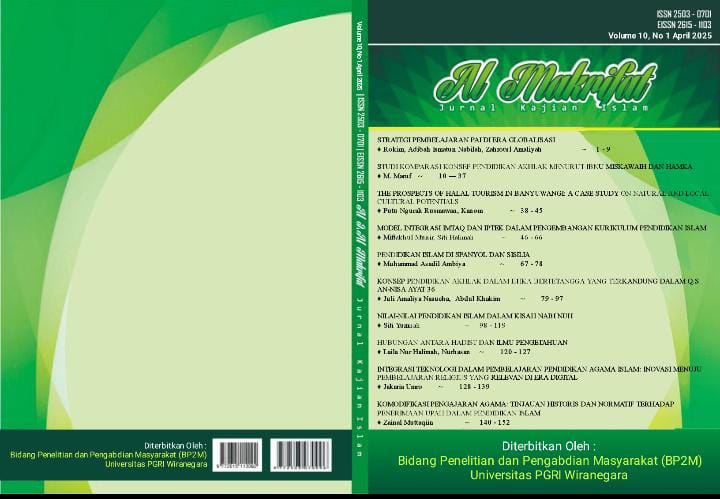Model Integrasi Imtaq dan Iptek Dalam Pengembangan Kurikulum Pendidikan Islam
Abstract
The development of student imtaq is no longer solely entrusted to PAI as a subject, but is carried out through complementary strategies directed to foster student imtaq, the intended strategy is the integration of imtaq material into science and technology material. That efforts to increase imtaq are not only the duties of Islamic religious education teachers (PAI), but also the duties of other teachers and all other school residents, even all related parties. One of the ways that can be taken is to combine the subject matter with imtaq values Islam's motivation in developing science and technology is very large. This is evident from the words of Allah and the hadith of the Prophet which states that knowledge is very important and Allah loves His servants who are knowledgeable and will even raise their degree. In addition, it is also proven by the number of scientists and Muslims who are experts in a certain discipline. Not only that, the development of science and technology during the time of the Abbasid Caliphate which was well developed is also proof that science is very important in Islam. However, it should also be remembered that the progress of science and technology needs to be supported by the progress and improvement of imtaq Integration between Imtaq and Science and Technology, so that it is appropriate and successful in accordance with the common expectations that the goal is to constantly find solutions/solutions, models/designs to be able to integrate/integrate easily between Imtaq and Science and Technology, but the expected results are, 1) the curriculum model that combines general subjects with religion is directed to provide mastery of knowledge or student learning outcomes about Science and Technology integrated with Imtaq, 2).it is also sought to improve student learning outcomes in mastery of science and technology, 3).the model that the author tries to concoct from the results of this imagination is also expected for students to combine general and religious subjects, 4).it is hoped that this model can give birth to other positive impacts, namely the creation of an improvement or improvement in teacher performance and an increase in student learning activitiesReferences
Zainuddin Ali, Pendidikan Agama Islam, (Jakarta: PT Bumi Aksara, 2007).
Abdul Rachman Shaleh, Pendidikan Agama Dan Pembangunan Watak Bangsa, (Jakarta: PT Raja Grafindo Persada, 2005).
Azyumardi Azra, Paradigm Baru Pendidikan Nasional; Rekontruksi Dan Demokratisasi, (Jakarta: PT Kompas Media Nusantara, 2002).
Dedi Supriadi, Membangun Bangsa Melalui Pendidikan, ( Bandung: PT Remaja Rosdakarya, 2005).
Wardiman Djojonegoro, Implementasi Nilai-Nilai Agama Dalam Memantapkan Sistem Pendidikan Nasional. Orasi Ilmiah di IKIP Bandung, Oktober 1995.
Harun Nasution,Pemabahruan Dalam Islam, Sejarah Pemikiran dan Gerakan, Jakarta: Bulan Bintang,1990.
M.Amin Abdullah, Falsafah kalam di Era Postmodernisme, Yogjakarta: Pustaka Pelajar, 1995.
Syamsul Arifin,dkk, Spiritualisasi Islam Dan Peradaban MasaDepan,Yogjakarta: Sipress,1996.
Mahdi Ghulsyani, Filsafat Sains Menurut al-Qur’an, Bandung: Mizan, 1998.




